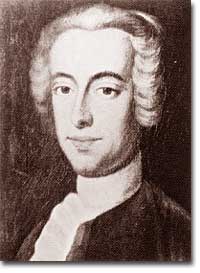10b. Sons and Daughters of Liberty

Royal Massachusetts Governor Thomas Hutchinson
They were the ones who were not afraid. They knew instinctively that talk and politics alone would not bring an end to British tyranny. They were willing to resort to extralegal means if necessary to end this series of injustices. They were American patriots — northern and southern, young and old, male and female. They were the Sons and Daughters of Liberty.
Like other secret clubs at the time, the Sons of Liberty had many rituals. They had secret code words, medals, and symbols. Originally formed in response to the Stamp Act, their activities were far more than ceremonial. It was the Sons of Liberty who ransacked houses of British officials. Threats and intimidation were their weapons against tax collectors, causing many to flee town. Images of unpopular figures might be hanged and burned in effigy on the town's Liberty Tree. Offenders might be covered in warm tar and blanketed in a coat of feathers.
Another important function of the Sons of Liberty was correspondence. These clubs could be found up and down the colonial seaboard. Often they coordinated their activities. Like the public Congresses that would be convened, this private band of societies provided an intercolonial network that would help forge unity. It should come as no surprise that the members of the Sons of Liberty and the delegates to the various Congresses were at times one and the same.
The Daughters of Liberty performed equally important functions. Once nonimportation became the decided course of action, there was a natural textile shortage. Mass spinning bees were organized in various colonial cities to make homespun substitutes. Since women often purchased consumer goods for the home, the Daughters of Liberty became instrumental in upholding the boycott, particularly where tea was concerned. The most zealous Daughters of Liberty refused to accept gentleman callers for themselves or their daughters who were not sympathetic to the patriot cause.
Of course, the winners write the history books. Had the American Revolution failed, the Sons and Daughters of Liberty would no doubt be regarded as a band of thugs, or at the very least, outspoken troublemakers. History will be on their sides, however. These individuals risked their lives and reputations to fight against tyranny. In the end, they are remembered as heroes.






